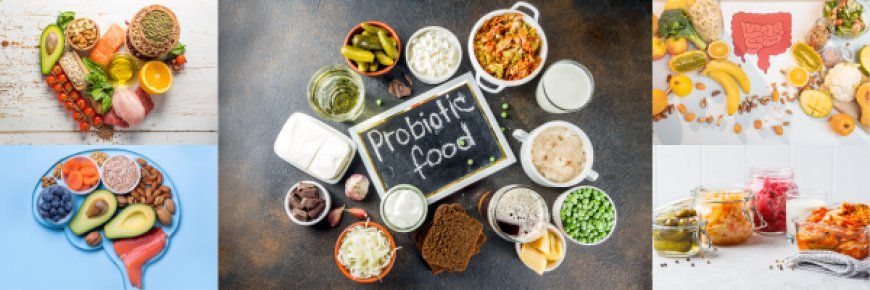"Unlocking Gut Health: The Power of Probiotics and Prebiotics"
Discover how probiotics and prebiotics can revolutionize your gut health. Learn about the benefits, best food sources, and how these bacteria and fibers work together to boost digestion and immunity.


Why Gut Health Matters
Gut health is increasingly recognized as the foundation of overall well-being. The trillions of bacteria living in your intestines, known collectively as the gut microbiome, influence everything from digestion to immune function. Maintaining a balanced gut microbiome can improve your digestive health, boost your immune system, and even support mental wellness.
The good news? You can directly impact the health of your gut through diet—specifically by consuming probiotics and prebiotics. These two powerful components work hand-in-hand to create a thriving gut environment, but they have different roles.
Understanding Probiotics: The Good Bacteria
Probiotics are live bacteria that benefit your body when consumed in the right amounts. They help replenish the gut’s natural bacteria, ensuring harmful bacteria don’t overtake the digestive system. These good bacteria support digestion, nutrient absorption, and help manage conditions like irritable bowel syndrome (IBS) and diarrhea.
Key Benefits of Probiotics:
- Improved Digestion: By aiding in the breakdown of food and absorption of nutrients, probiotics help prevent bloating and constipation.
- Enhanced Immunity: A healthy gut strengthens the body’s defenses against infections by regulating the immune response.
- Mental Health Benefits: New research suggests that probiotics may also improve mood and mental health through the gut-brain connection, reducing symptoms of anxiety and depression.
Top Sources of Probiotics:
- Yogurt: Packed with live cultures like Lactobacillus and Bifidobacterium.
- Kombucha: A fermented tea filled with gut-friendly bacteria.
- Sauerkraut: Fermented cabbage that’s rich in lactic acid bacteria.
- Miso: A fermented soybean paste used in soups and sauces.
- Kimchi: A Korean fermented vegetable dish that’s high in probiotics.
Prebiotics: The Fuel for Probiotics
Prebiotics are non-digestible fibers that serve as food for the good bacteria in your gut. While probiotics are live organisms, prebiotics help those organisms thrive by feeding them. Without prebiotics, probiotics can’t function optimally, making them a crucial part of your diet.
Key Benefits of Prebiotics:
- Improved Probiotic Function: Prebiotics help probiotics multiply and flourish in the gut, enhancing their effectiveness.
- Better Nutrient Absorption: They help the body absorb key minerals, such as calcium and magnesium, by supporting healthy bacteria.
- Digestive Regularity: Prebiotics help maintain bowel regularity by promoting the growth of beneficial bacteria.
Top Sources of Prebiotics:
- Garlic: A powerful source of prebiotics that also has antimicrobial properties.
- Onions: Rich in inulin, a type of prebiotic fiber.
- Bananas: Especially unripe bananas, which contain high levels of resistant starch.
- Asparagus: Contains inulin, which promotes gut health.
- Chicory Root: A concentrated source of prebiotic fiber used in many supplements.
How Probiotics and Prebiotics Work Together
For optimal gut health, it’s important to consume both probiotics and prebiotics. Probiotics are the beneficial bacteria that improve digestion and immunity, while prebiotics are the fibers that nourish those bacteria. Together, they create a balanced environment where good bacteria can thrive and harmful bacteria are kept in check.
To get the full benefits of probiotics and prebiotics, focus on integrating both into your daily meals. For example, have a serving of yogurt with some banana slices, or a miso soup with a side of asparagus. This combination ensures that the good bacteria in your gut are not only present but are also thriving.
Why a Healthy Gut is Essential
The benefits of a healthy gut go beyond just digestion. Your gut microbiome influences everything from your immune response to your mental health. A gut that's in balance can prevent inflammation, improve mental clarity, and enhance your overall mood. On the other hand, an imbalanced gut can lead to issues like bloating, skin problems, and fatigue.
Conclusion: Taking Steps Toward a Healthier Gut
Probiotics and prebiotics are key components to achieving and maintaining a healthy gut. By regularly consuming fermented foods, fiber-rich vegetables, and possibly adding a supplement, you can improve your digestion, strengthen your immune system, and boost your overall well-being. Start small by incorporating a few probiotic and prebiotic-rich foods into your daily routine, and feel the difference in your gut health over time.
What's Your Reaction?









































































